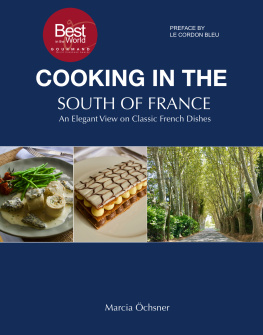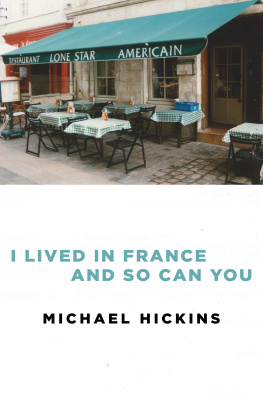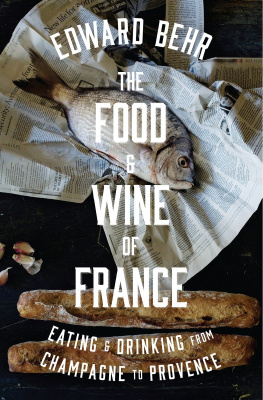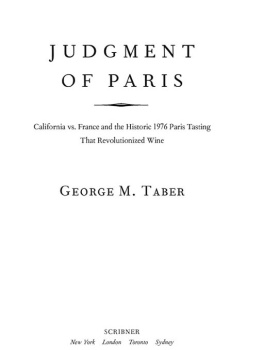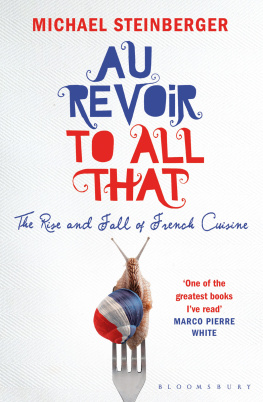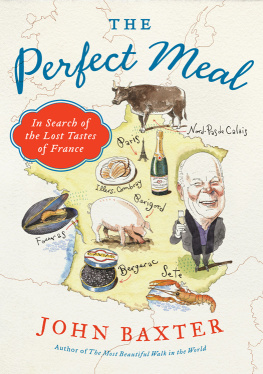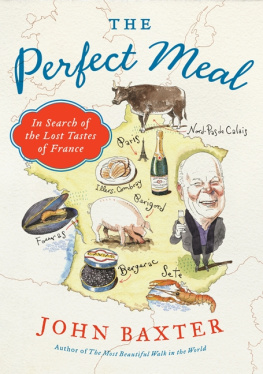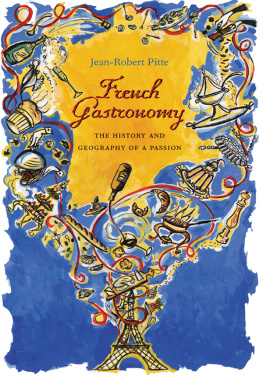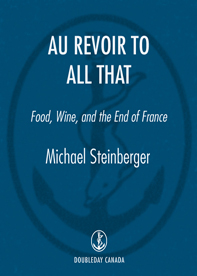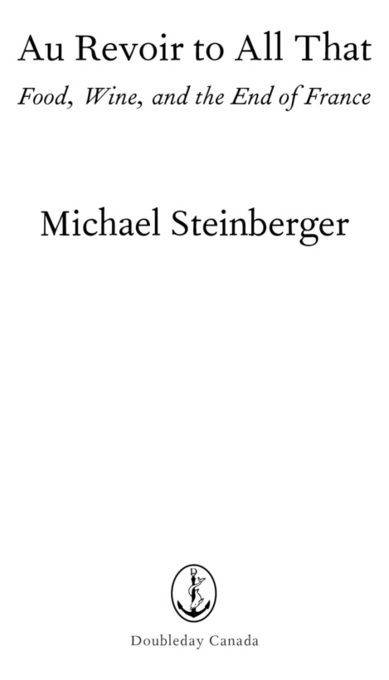Copyright 2009 Michael Steinberger
Published by arrangement with Bloomsbury USA, a division of Diana Publishing
All rights reserved. The use of any part of this publication, reproduced, transmitted in any; form or by any means electronic, mechanical, recording or otherwise, or stored in a retrieval system without the prior written consent of the publisheror in the case of other reprographic copying, license from the Canadian
Copyright Licensing agencyis an infringement of the copyright law.
Excerpt from Auguste Escoffier: Memories of My Life (Hoboken, NJ: John Wiley & Sons, 1996), by Auguste Escoffier, reprinted by permission of the publisher.
Excerpt from The Coming of Age of American Restaurants, New York Times, December 30, 1998, reprinted by permission of Ruth Reichl.
Excerpt from Camembert: A National Myth (Berkeley: University of California Press, 2003), by Pierre Boisard, reprinted by permission of the publisher.
Excerpt from Enter a New French Superchef, by Craig Claiborne from the New York Times, January 20, 1988. 1988 the New York Times. All rights reserved. Used by permission and protected by the copyright laws of the United States. The printing, copying, redistribution, or retransmission of the material without express written permission is prohibited.
Doubleday Canada and colophon are trademarks
Library and Archives Canada Cataloguing in Publication
Steinberger, Michael
Au revoir to all that : food, wine, and the end of France / Michael Steinberger.
eISBN: 978-0-385-67326-6
1. Cookery, French. 2. Wine and wine makingFrance. 3. Gastronomy.
4. FranceHistory21st century. I. Title.
TX637.S74 2009 641.0130944 C2008-906821-1
Published in Canada by Doubleday Canada,
a division of Random House of Canada Limited
Visit Random House of Canada Limiteds website: www.randomhouse.ca
v3.1
To Kathy, James, and Ava
CONTENTS
Introduction
O N AN UNCOMFORTABLY WARM September evening in 1999, I swapped my wife for a duck liver. The unplanned exchange took place at Au Crocodile, a Michelin three-star restaurant in the city of Strasbourg, in the Alsace-Lorraine region of France. We had gone to Crocodile for dinner and, at the urging of our waiter, had chosen for our main course one of Chef mile Jungs signature dishes, Foie de Canard et cailles de Truffe en Crote de Sel, Baeckeofe de Lgumes. Baeckeofe is a traditional Alsatian stew made of potatoes, onions, carrots, leeks, and several different meats. Jung, possessed of that particular Gallic genius for transforming quotidian fare into high cuisine, served a version of baeckeofe in which the meats were replaced by an entire lobe of duck liver, which was bathed in a truffled bouillon with root vegetables and cooked in a sealed terrine. The seal was broken at the table, and as soon as the gorgeous pink-gray liver was lifted out of its crypt and the first, pungent whiff of black truffles came our way, I knew our palates were about to experience rapture. Sure enough, for the ten minutes or so that it took us to consume the dish, the only sounds we emitted were some barely suppressed grunts and moans. The baeckeofe was outrageously goodthe liver a velvety, earthy, voluptuous mass, the bouillon an intensely flavored broth that flattered everything it touched.
We had just finished dessert when Jung, a beefy, jovial man who looked to be in his mid-fifties, appeared at our table. We thanked him profusely for the meal, and my wife, an editor for a food magazine, asked about some of the preparations. From the look on his face, he was smitten with her, and after enthusiastically fielding her questions, he invited her to tour the kitchen with him. Well leave him here, he said, pointing at me. As my wife got up from the table, Jung eyed her lasciviously and said, You are a mango woman! which I took to be a reference to her somewhat exotic looks (she is half-American, half-Japanese). She laughed nervously; I laughed heartily. As Jung squired her off to the kitchen, I leaned back in my chair and took a sip of Gewrztraminer.
By now, it was midnight, the dining room was almost empty, and the staff had begun discreetly tidying up. After some minutes had passed, Madame Jung, a lean woman with frosted blonde hair who oversaw the front of the restaurant, approached my table, wearing a put-upon smile which suggested this wasnt the first time her husband had taken a young female guest to see his pots and pans. Perhaps hoping to commiserate, she asked me if everything was okay. Bien sr, I immediately replied, with an enthusiasm that appeared to take her by surprise. I was in too much of a stupor to engage in a lengthy conversation, but had I been able to summon the words, I would have told her that her husband had just served me one of the finest dishes Id ever eaten; that surrendering my wife (in a manner of speaking) was a small price to pay for such satisfaction; and that Id have gladly waited at the table till daybreak if thats what it took to fully convey my gratitude to Monsieur Jung.
In the end, I didnt have to wait quite that long. After perhaps forty-five minutes, Jung returned my wife to the table. She came back bearing gifts: two bottles of the chefs own late-harvest Tokay Pinot Gris and, curiously, a cold quail stuffed with foie gras, which had been wrapped in aluminum foil so that we could take it with us. We thanked him again for the memorable dinner and his generosity, and then he showed us to the door. There, I received a perfunctory handshake, while my wife got two drawn-out pecks, one to each cheek. She got two more out in front of the restaurant, and as we walked down the street toward our hotel, Jung joyfully shouted after her, You are a mango woman! his booming voice piercing the humid night air.
Early the next morning, driving from Strasbourg to Reims in a two-door Peugeot that felt as if it was about to come apart from metal fatigue, my wife and I made breakfast of the quail. We didnt have utensils, so we passed it back and forth, ripping it apart with our hands and teeth. As we wound our way through the low, rolling hills of northeast France, silently putting the cold creature to an ignominious end, I couldnt help but marvel at what had transpired. Where but in France could a plate of food set in motion a chain of events that would find you whimpering with ecstasy in the middle of a restaurant; giving the chef carte blanche to hit on your wife, to the evident dismay of his wife; and joyfully gorging yourself just after sunrise the next day on a bird bearing the liver of another bird, a gift bestowed on your wife by said chef as a token of his lust? The question answered itself: This sort of thing could surely only happen in France, and at that moment, not for the first time, I experienced the most overwhelming surge of affection for her.
I first went to France as a thirteen-year-old, in the company of my parents and my brother, and it was during this trip that I, like many other visitors there, experienced the Great Awakeningthe moment at the table that changes entirely ones relationship to food. It was a vegetable that administered the shock for me: Specifically, it was the baby peas (drowned in butter, of course) served at a nondescript hotel in the city of Blois, in the Loire Valley, that caused me to realize that food could be a source of gratification and not just a means of sustenancethat mealtime could be the highlight of the day, not simply a break from the days activities.


